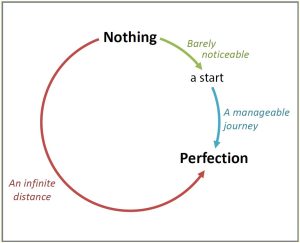 I started my book on energy and resource efficiency (available free as a pdf) with a traditional saying:
I started my book on energy and resource efficiency (available free as a pdf) with a traditional saying:
“How do you eat an elephant? Why, one bite at a time, of course”.
In the section on availability barriers to resource efficiency, I argued that we can drive a successful efficiency programme by getting a lot of people to regularly dedicate a little time rather than by getting a few people to commit a lot of time. Clearly, we need to start with where people are at and it is often unrealistic to ask someone to make a large change in their behaviour from the outset. Indeed, asking for too much or holding back for “perfection” are the root causes of many programme failures I have observed with my own eyes. So starting small is a reasonable strategy.
Is that true, though? Some argue that if all that we request in terms of change is a minor action, then this will result in – surprise, surprise – a small result! Folks like Donella Meadows, Bob Doppelt and many others have reasoned eloquently that no less than a fundamental change to our underlying systems will deliver the scale of change needed to address the magnitude of the problems we face. Similarly, Cambridge Professor David MacKay, in his fantastic book Sustainable Energy — without the hot air asserts: read more…





